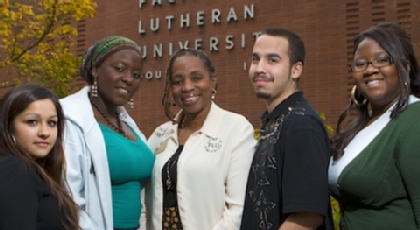Page 294 • (6,930 results in 0.153 seconds)
-
Student Life DepartmentsWe want to get to know you! We hope you will visit our offices for additional information or just to get to know us! We’re here to help! Contact us at slif@plu.edu or 253-535-7200. The Division of Student Life provides programs and services that advance the development and well-being of students and includes the following departments:Campus Ministry More InfoCampus Safety More InfoCampus Life More InfoCounseling Center More InfoDean of Students More InfoHealth Center
-
panels are held in the Scandinavian Cultural Center, AUC. Refreshments provided. Tuesday April 2, 6 p.m. | Business Alumni Panel and NetworkingRoom: Scandinavian Cultural Center, AUC Join us for a Q&A panel from PLU alumni industry professionals to gain first hand insight into the business field. Additionally, hear how their graduate education played a role in their career development. There will also be a time at the end to network with the panelists and other attendees.Wednesday April 3, 6 p.m
-
EventsPLUSC Fall Coffee Event 2020 Date TBD Enjoy this annual event held by your PLUSC. Typically a fall event, PLUSC in partnership with our coffee vendor, Dillanos, is happy to provide you with a free drink to go! Typically held during fall break this event is a chance for staff to stay and mingle for a bit, or grab-and-go, while enjoying a thank you from your PLU Staff Council for all the work you do! PLUSC Spring Social 2021 Date TBD Enjoy this annual event held by your PLUSC. Typically a
-
whole student, we pursue real world questions of ethics, morality, faith, and language in places ranging from archives to community centers to social media platforms. These questions emerge for us at the intersection of our professional lives and our experience as citizens, and they resonate deeply with our students, who identify unique questions related to their own distinct communities of interest. In this feature story you will be introduced to four PLU faculty members navigating the literal and
-
engagement with nature and the more-than-human? Third, what kinds of conversations arise when social annotation invites members of diverse communities to read together? This public collaborative reading project aims to bring Austen readers together to slowly wander through her novels, one chapter a week, using social annotation, and to engage our sense of wonder as we (re)discover Austen’s environments.
-

infection rates in the neonatal intensive care unit of the country’s largest hospital, Windhoek Central Hospital. And while the research isn’t directly tied to neurosurgery, her work in this area has the potential to affect multiple aspects of the medical field. “I’ve narrowed my research down to whether hand hygiene and infection control interventions reduce hospital-associated central line infections,” Larios says. “There’s only been three studies done on this subject, and none were in Namibia.” She
-

: Flexibility for students with full-time jobs, children or other household responsibilities Preparing for career advancement while working full-time May qualify for employer’s educational benefits No travel time (can attend classes at home) Accessible from anywhere including out-of-state locations Great support during online studies (individual appointments and video calls with faculty, student support services at any time for technical or administrative issues, online messaging and social media groups
-

been three studies done on this subject, and none were in Namibia.” She plans to observe nurses and doctors to understand current hygiene standards before working with staff to create a collaborative infection control course to implement new standards.But her time in Namibia won’t just be spent conducting research. She will also teach marimba to fourth- and fifth-grade girls at a local private school. More than an aspiring doctor, Larios is also an accomplished musician and has been playing
-

Nordquist’s history of PLU, “Education for Service, Pacific Lutheran University, 1890-1990,” the university was a “showcase institution” in the handling of global studies, as determined by to the U.S. Office of Education. PLU professors soon began traveling to China to teach and, students were starting to study abroad. By 1988, 6 percent of the student population had citizenship of someplace other than the United States. In the following years, that percentage has not changed much. Today, that percentage
-
-graduation. My education at PLU taught me to see the importance of connecting with my community, the joy of making music of all kinds, and the happiness that comes from serving others.”Kathleen HaugheyKathleen graduated in 2011 with two degrees—a Bachelor of Music in Cello Performance and a Bachelor of Arts in Hispanic Studies. During her time at PLU, Kate was able to combine her love of language and culture by performing many concert and chamber works from Spain and Latin America and spent the fall of
Do you have any feedback for us? If so, feel free to use our Feedback Form.


